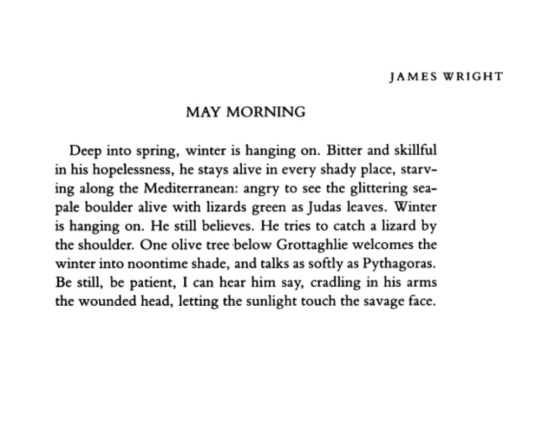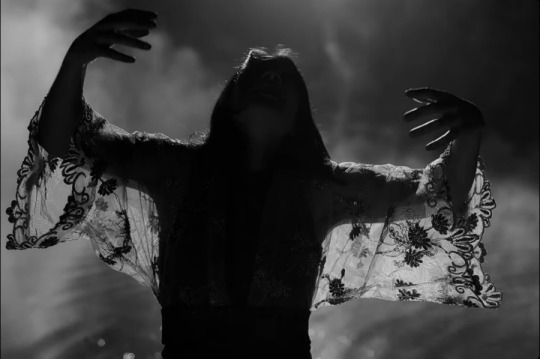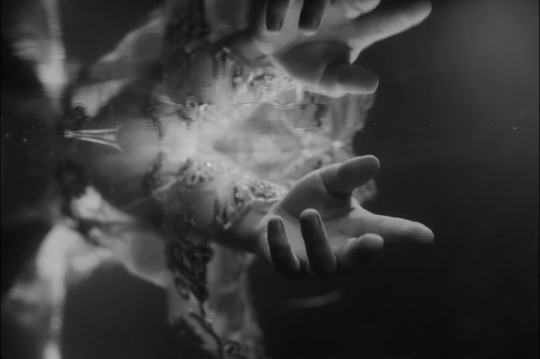Text
“You shall not go down twice to the same river, nor can you go home again. That [Shevek] knew; indeed it was the basis of his view of the world. Yet from that acceptance of transience he evolved his vast theory, wherein what is most changeable is shown to be fullest of eternity, and your relationship to the river, and the river’s relationship to you and to itself, turns out to be at once more complex and more reassuring than a mere lack of identity. You can go home again... so long as you understand that home is a place where you have never been.”
– Ursula K. Le Guin, The Dispossessed
4K notes
·
View notes
Text
Viktor Ullmann : "Abendphantasie" (n° 3 des "Gesänge nach Gedichten von Friedrich Hölderlin) (Theresienstadt, 1943)
Mitsuko Shirai (mezzo-soprano)
Harmut Höll piano)
Enr. 2001
2 notes
·
View notes
Text
In 1931, the Austrian logician Kurt Gödel pulled off arguably one of the most stunning intellectual achievements in history.
Mathematicians of the era sought a solid foundation for mathematics: a set of basic mathematical facts, or axioms, that was both consistent — never leading to contradictions — and complete, serving as the building blocks of all mathematical truths.
But Gödel’s shocking incompleteness theorems, published when he was just 25, crushed that dream. He proved that any set of axioms you could posit as a possible foundation for math will inevitably be incomplete; there will always be true facts about numbers that cannot be proved by those axioms. He also showed that no candidate set of axioms can ever prove its own consistency.
His incompleteness theorems meant there can be no mathematical theory of everything, no unification of what’s provable and what’s true. What mathematicians can prove depends on their starting assumptions, not on any fundamental ground truth from which all answers spring.
Natalie Wolchover, How Gödel’s Proof Works, Quanta Magazine, July 14, 2020
30 notes
·
View notes
Text

Tempio Mariano di Monte Grisa (1963-65) in Trieste, Italy, by Antonio Guacci. Photo by Jamie McGregor Smith.
286 notes
·
View notes
Text
It is one of the unexpected disasters of the modern age that our new unparalleled access to information has come at the price of our capacity to concentrate on anything much. The deep, immersive thinking which produced many of civilization's most important achievements has come under unprecedented assault.
We are almost never far from a machine that guarantees us a mesmerizing and libidinous escape from reality. The feelings and thoughts which we have omitted to experience while looking at our screens are left to find their revenge in involuntary twitches and our ever-decreasing ability to fall asleep when we should.
Alain de Botton, Religion for Atheists: A Non-Believer's Guide to the Uses of Religion
151 notes
·
View notes
Text
With this increasing tendency to imbue products and services with spirituality, the discourse surrounding mysticism has been extracted from its historical context.
It has been secularised through the lenses of medicine, capitalism, and psychology and ultimately reincorporated into religious and pastoral scenarios.
As McIntosh succinctly states, ‘spirituality without theology becomes rootless, easily hijacked by individualistic consumerism’.
Thus, spiritual directors commonly speak of John of the Cross’ Dark Night of the Soul in psychotherapeutic terms.
By misconstruing the Dark Night as merely an experience of darkness, or an experiential indicator of psychological wholeness, we risk diminishing its complexity.
This misconception threatens to position the discipline of spiritual direction merely as an alternative technology promoting psychological well-being within a marketplace dominated by experientially focused methodologies and products.
The risk is reducing the deeply nuanced nature of the Dark Night to the confines of contemporary experientialist ideologies.
In short, the centrality of experientialism in spiritual direction refects and resonates with many forms of psychotherapeutic practices to the extent that the dividing line between psychotherapy and spiritual direction is sometimes difficult to distinguish.
The Direction of Desire
Mark Gerard Murphy
7 notes
·
View notes
Photo










Shot for the New York Times T MAGAZINE JAPAN
Koei Hoshino, a nun at Sanko-in temple in Koganei, Tokyo, is a master Shojin Ryori chef ( Zen Buddhist vegetarian cooking - literally ‘devotion cuisine’). She grows everything on location in a quiet garden behind her kitchen (except the miso paste which she sources from Kyoto). She also grows prize-winning hydrangeas which she uses as a garnish to her magnificent food.
It was such a pleasure being able to follow her through one of her days! If you find yourself in Tokyo, do yourself a favor and have lunch with her - meals start at noon, sharp (and I do mean sharp).
Shot on Kodak Portra 160 using Leicas.
648 notes
·
View notes
Text
These are the humanitarian heroes of #Gaza. The indigenous and the unsung.
375 notes
·
View notes
Text
2K notes
·
View notes
Text
youtube
Louis Glass (1864-1936) - Cello Sonata in F Major, Op. 5: II. Andante placido e sostenuto ·
Henrik Brendstrup · Christina Bjørkøe
3 notes
·
View notes
Text
youtube
Mieczyslaw Karlowicz (1876-1909) : Eternal Songs,Op.10 (1906).
I.Song of Everlasting Yearning:10:51 II.Song of Love and Death:11:37 III.Song of Eternal Being:5:33
New Zealand Symphony Orchestra, Antoni Wit
3 notes
·
View notes
Text
"Nobody can escape suffering, and to try to escape passion is to try to escape suffering. But as you cannot escape suffering you cannot escape passion; you will suffer from passion either directly or indirectly, and it is much better to suffer directly because indirect suffering has no merit. It is exactly as if nothing has happened. So the indirect suffering in a neurosis has no moral merit. Years lost in neurosis are just lost, without gain."
— C.G. Jung, Zarathustra Seminar
16 notes
·
View notes
Text
Palestinian Lullaby (Ya Lel Ma Atwalak) by Rim Banna (1993)
112 notes
·
View notes
Text

note: although this was printed as a prose poem, the form conceals a perfect sonnet written in iambic pentameter.
457 notes
·
View notes









